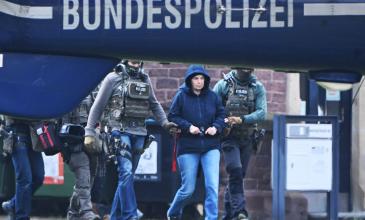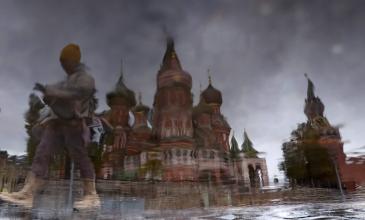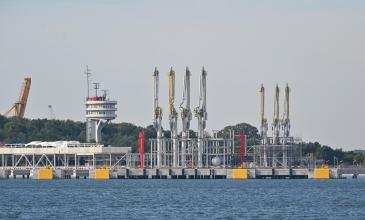Analysis
-

Clipped wings, or how Kremlin propaganda is using Ukraine's multirole combat aircraft, which it does not yet have
The first Danish F-16 Fighting Falcons are expected to arrive in Ukraine in June or July. Poland's neighbour has high hopes for these multirole fighters. On the other hand, Western experts emphasize that the Falcons in Ukrainian skies will not be a game changer, and that maintaining them will be a huge challenge. But Russia seems to be seriously concerned. In recent days, the Kremlin-controlled mass media have been flooded with articles suggesting that they have already suffered a humiliating defeat, despite the fact that the Falcons with the painted trident have not yet taken to the skies. And in the process, they have unleashed World War III.
-

AI is a tool just like any other. Through its use, you can identify a criminal, assist in an investigation but also lose a fortune or be manipulated
For example, on the one hand, artificial intelligence (AI) was used to help track down a former Red Army Faction (RAF) terrorist who had been wanted for three decades. On the other, it was applied by cybercriminals in Hong Kong to steal USD 25 million from a company. In the latter situation, an employee transferred money to the cybercriminals' account thinking his bosses had given him the go-ahead to complete the transaction. This shows that it can be quite simple to fool someone through AI. In the Hong Kong incident, the fraudsters had used AI-generated virtual profiles, to deceive victims with a chatbot-generated text message, while in other cases they recreated the voice of a loved one played over the phone.
-

A fast-track course on the alternative history of Central and Eastern Europe, or Tucker Carlson's interview with Vladimir Putin
There were several misrepresentations of history in an interview conducted by US journalist Tucker Carlson with Russian President Vladimir Putin and published, among other, on the X portal on 8 February, 2024. In the half-hour lecture on how the Kremlin perceives the history of Central and Eastern Europe, which the Russian president gave at the beginning of the interview, several misrepresentations were made about Poland and Ukraine: Poland collaborated with Hitler before 1939 and jointly partitioned Czechoslovakia; Ukraine is an artificial state created at Stalin’s will; The name 'Ukraine' was invented by Poles
-

Post-election analysis of Taiwan's models for combating disinformation
A few months before Taiwan's presidential and parliamentary elections, the People's Republic of China (PRC) intensified its disinformation offensive. China’s propaganda focused on security, economic stability, and Taiwan-US relations. Politicians including outgoing president Tsai Ing-wen, Democratic Progressive Party (DPP) chairman Lai Ching-te (also known as William Lai) and his deputy, Hsiao Bi-khim, became targets. On 13 January 2024, Ching-te won the presidential election, Hsiao Bi-khim will be vice-president and the DPP's victory guarantees that Taiwan will continue its sovereign and assertive policy towards PRC.
-

Information war between Israel and Hamas
The war between Israel and Hamas, which started 7 October 2023, is not only about street-by-street gains in an urban battle. It has also produced misinformation and disinformation spreading through social media. Each side has attempted to shape perceptions through any means necessary, and false information play a key role. According to Rand Corporation (an American nonprofit global policy think-tank), this information war plays out on several fronts. Israel and Hamas release information that is to their advantage. IDF highlights Hamas's use of human shields. Hamas plays up the civilian toll. The information war between Israel and Hamas is so serious that it even has its own Wikipedia page
-
AI is neither good nor bad. It’s a tool that we can use to both fact-check and spread disinformation
Over the past few years, deepfake technology has been quite clumsy and it was easy to ascertain the difference between real and artificially generated stories. Today, this is a growing problem. Researchers from the Australian National University have reached a surprising conclusion. “They proved that faces generated entirely by artificial intelligence (AI) seem to be more realistic than real human faces,” Piotr Luczuk, PhD, a media and cybersecurity expert as well as the deputy director of the Institute of Media Education and Journalism at the Cardinal Stefan Wyszyński University in Warsaw, told FakeHunter.
-

Artificial intelligence as authenticity tester or great art through the eye of the machine. AI will not replace humans, at least for the time being
If Philip K. Dick's androids could dream of electric sheep, why shouldn't artificial intelligence (AI) dream of rococo pastoral scenes? In 2020, scientists at the Los Alamos Laboratory, USA, proved that some machines can not only fall asleep, but should take a power nap. They need a break in order to absorb knowledge more efficiently. But the knowledge can vary. AI used to verify the authenticity of paintings has already had its first successes, but also failures. And where the machine fails, humans step in.
-

Polish NGOs' support to Ukraine. Fact and figures
The Association of Polish Non-Governmental Initiatives Confederacy prepared a report with information on the participation of Polish NGOs in projects and initiatives aimed at supporting Ukrainians since the beginning of Russia's full-scale, brutal invasion. The report was presented on 7 December 2023 in Kiev. The report shows figures and facts regarding Polish NGOs' support for Ukraine.
-

The Kremlin’s propaganda still targets Poland and the Western countries
This year's Independence March in Warsaw was not anti-Ukrainian as its main slogan was “Poland is not yet lost” (which is a phrase from Poland’s national anthem). The ongoing war in Ukraine continues to be one of the main topics of Russian propaganda. Russia replaces the lack of military successes with numerous fake-news spread mainly via social media. It is true that a group of participants of the Independence March carried anti-Ukrainian banners, so Russian propaganda eagerly exploited this.
-

Solutions to European energy crisis – LNG, hydrogen, or maybe neutrinovoltaic?
Since the Russian invasion of Ukraine supplies of Russian gas—critical for heating, industrial processes, and power—have been cut by more than 80 percent in 2022. Wholesale prices of electricity and gas have surged as much as 15-fold since early 2021.According to Euronews, to cope with dwindling Russian gas supplies, the European Union has massively increased its LNG imports (liquefied natural gas), particularly from the USA. In 2022, US exports to the EU jumped by 143 percent year-on-year.
Pagination
- Page 1
- Next page